FM Gordan Grlić Radman Says Croatians in Israel Are Safe
ZAGREB, 14 May, 2021 - All Croatian citizens in Israel are safe, Foreign and European Affairs Minister Gordan Grlić Radman said on Friday, and expressed solidarity with the families of the civilian victims on all the sides and called for the de-escalation of the Israeli-Palestinian conflict.
On 12 May, Croatia called on all the parties in the Israeli-Palestinian conflict to refrain from any action that would lead to escalation of violence, in which dozens of people have been killed so far, including civilians.
"There is no justification for attacks on civilians," the Croatian Ministry of Foreign and European Affairs said in a statement last Wednesday, calling on all leaders to help de-escalate the conflict.
Grlić Radman said today that so far Zagreb was in permanent contact with the Croatian Embassy in Israel and was kept informed on a regular basis.
None of the Croatians in Israel have asked for assistance, he added.
It is most saddening that civilians are among the casualties. We extend our solidarity with the families of civilian casualties, and we appeal to all parties for defusing the tensions, the Croatian minister said.
The Middle East crisis has always been very sensitive, and those developments can simply spill over to some other regions, Grlić Radman said.
The European Union with its partners, including the USA, keep calling for multilateral action, he added.
"It is in the interest of all to have a sound, stable, peaceful global order, based on the respect for international and human rights," he said.
Grlić Radman said he did not believe that the USA was insufficiently engaged in that region and he believes that the Joe Biden Administration will make some headway in that regard.
Commenting on the fiercest fighting between Israel and the Palestinians in the last few years, President Zoran Milanović said on Thursday that the USA should define its foreign policy more clearly, noting that the new US energy policy was making that part of the world less interesting than it was before.
"I look at the American position. Israel is defending itself, but is also attacking. (...) The Americans will have to better define their foreign policy and make it clearer," Milanović said yesterday.
Unlike his predecessor Donald Trump, President Joe Biden has distanced himself from the Middle East, but is now aware that he cannot distance himself completely, he said.
"That part of the world is ceasing to be interesting as it used to be because of the US energy policy, notably because of this administration, which is much more focused on renewable sources and less on oil, on hydrocarbons which America now produces in sufficient quantities on its own. So the question is, what is their strategic objective in the Middle East other than being a policeman?" Milanović said. "These are extremely important issues that put us in a moral dilemma."
For more about diplomacy in Croatia, follow TCN's dedicated page
Croatia to Join MED 7 Alliance Says Minister of Foreign Affairs
May 13, 2021 - After his visit to Spain, Croatian Minister of Foreign Affairs, Gordan Grlic Radman announced the possibility of Croatia joining the Med 7 alliance.
Croatia might be joining the alliance of Mediterranean and southern European countries know as MED 7. Minister of Foreign Affairs Gordan Grlic Radman returned from a two-day visit to Madrid where he discussed this option with his Spanish colleague Minister Arancha Gónzalez Laya. The official announcement is expected in autumn at the yearly meeting of the alliance on Crete.
MEDT 7 or EuroMed 7 is an alliance of 7 countries of the Mediterranean region. Member countries are Spain, Greece, Italy, France, Portugal, Malta, and Cyprus. Portugal is the only country within the alliance that is not a Mediterranean country. However, it is a part of the wider region. MED 7 was established in 2013 following the initiative by Spain and Cyprus. The idea behind the group is to be able to form common stances on issues of interest. All countries in the group are EU countries.
Croatia to Fit in Well
According to Minister Grlic Radman, as reported by tportal.hr, Croatia fits well into the group and satisfies all necessary prerequisites for joining the alliance. He also expressed his belief in the need for Croatia to participate in discussions about the issues facing the Mediterranean region. Minister noted how the group will gain much from Croatian participation as well. In order to join the alliance, Croatia will have to approach each of the member countries individually.
Some of the main issues that the alliance might deal with in the near future are climate change, illegal immigration, pollution, and cooperation with non-European countries of the Mediterranean region.
It makes sense for Croatia to join such an alliance. After all, it does make up for most of the eastern Adriatic coastline. With the political power balance in the EU changing with Brexit finally coming to its end stage, it will be interesting to see whether Mediterranean countries can take a more important role in shaping EU policies.
For more about diplomacy in Croatia, follow TCN's dedicated page.
Friends of Croatia: Ministry of Foreign and European Affairs - The Croatian Side of Diplomatic Relations
May 13, 2021 - The fourth article in the series "Friends of Croatia: Ministry of Foreign and European Affairs" takes a look at the Croatian diplomatic relations from the perspective of the appointed ministry for diplomatic questions and foreign relations.
It takes two to build a friendship. While this series focuses on conversations with ambassadors, diplomats, and representatives of international organizations in Croatia, what is the official take on diplomatic relations and diplomacy from the Croatian side?
The Ministry of Foreign and European affairs (currently run by minister Gordan Grlić Radman) is the branch of the Croatian government that is the first and foremost point of contact and communication with the international community. If you are a country that wants to have diplomatic relations with Croatia, this is the ministry to reach.
„If diplomatic relations have been established between two countries, the sending country expresses the intention of opening a diplomatic mission (Embassy) to the receiving country, in this case, the Republic of Croatia, with a verbal note and seeks the consent of the competent institutions of the Republic of Croatia“, explained the Ministry the process of establishing Embassies.
„The competent authorities of the Republic of Croatia carry out the procedure of issuing the consent for the opening of a diplomatic mission and, upon its completion, inform the sending country about the outcome by verbal note. If the decision on giving consent for the opening of the Embassy in the Republic of Croatia has been granted, the sending country can start searching for a location to accommodate the Embassy and start the procedure of appointing an Ambassador," the Ministry added.
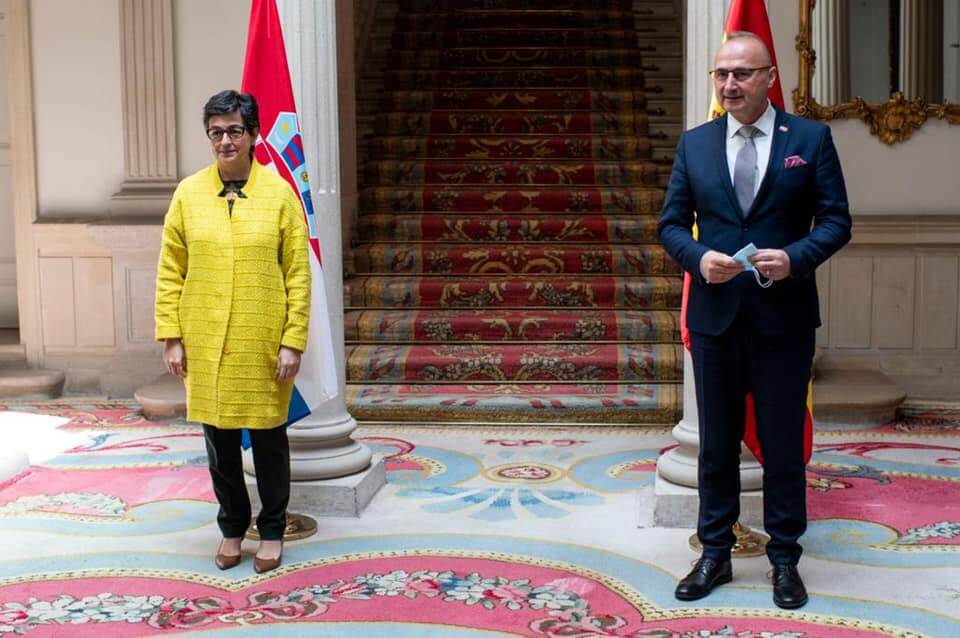 Foreign Minister Gordan Grlić Visiting Spain © Ministarstvo vanjskih i europskih poslova
Foreign Minister Gordan Grlić Visiting Spain © Ministarstvo vanjskih i europskih poslova
With this procedure in place, concluding with 2021, Croatia has 56 resident Embassies, 67 non-resident Embassies, 4 Consulates General, 3 Representative Offices of the bodies of the European Union, 8 Representative Offices of international organizations, and 103 Consulates General/Consulates/Vice-consulates (which what is interesting, as the Ministry pointed out, are handled by honorary consuls who are mostly Croatian citizens).
„Resident Embassies can be based only in the capital city, and they are headed by an ambassador. Non-resident Embassies are located outside the state, with a seat in some other country, usually, an EU member state, while Consulates Generals can be located in other larger cities besides the capital and are headed by general consuls and responsible for their work to the Embassy of the said country“, explained the Ministry.
Croatia may be a young county with 30 years of sovereignty, but the tradition of its diplomacy is traced deep in history. Most notably, in the Dubrovnik Republic, a role model to Croatian diplomats even today.
„Croatian diplomats take pride and inspiration in the tradition of diplomacy of the Dubrovnik Republic. As a small country, surrounded by powerful empires and influential Mediterranean city-states, with no military force, the Dubrovnik Republic was able to preserve its foreign policy sovereignty mainly thanks to the diplomatic skills and the awareness of its geopolitical position. These very qualities are constantly a source of inspiration for those who defend the interests of the Republic of Croatia on the modern world's stage“, explained the Ministry.
As is evident by following the work of the Ministry of European and Foreign Affairs, Croatia takes its diplomacy very seriously, and of course, with some countries, this is more evident than in others. One of the most recent examples was with Egypt. At the end of March, as TCN reported, Croatia showed solidarity with Egypt donating 100 books, and additionally, Croatian companies expressed interest in doing business on the Egyptian market.
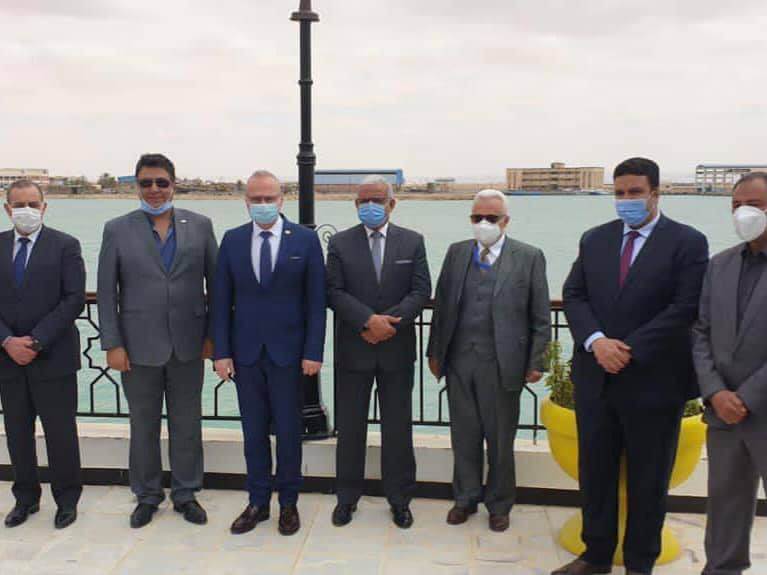
Foreign Minister Gordan Grlić in Egypt © Ministarstvo vanjskih i europskih poslova
„Minister Grlić Radman’s visit to Egypt was very successful, with his Egyptian counterpart Minister Shoukry opening a business forum which was attended by more than 120 Egyptian and Croatian business people“, said the Ministry, adding that representing the interests of Croatian companies and Croatian economy, in general, is an important task for Croatian diplomacy“.
Companies can ask for help by contacting the Ministry, specifically the Directorate General for Economic Affairs and Development Cooperation, or the Croatian embassy in the country of interest directly. No matter which way the request is made (regardless of whether the company has contacted the Ministry or the Croatian embassy in the country of interest directly) the company is kindly asked to fill out a request for support to the exporter, available on the economic diplomacy webpage. Within a couple of days, the company will receive a proposal for the realization of its request or an invitation to a meeting to discuss it jointly in more detail. All requests of exporters are recorded in a database that can be accessed by all employees of the Ministry in Zagreb and abroad in charge of economic affairs and through which the status of the case can be monitored“, explained the ministry the process of stepping on the market in more details.
Embassies in Croatia that are in frequent contact with the Ministry are there for their citizens when visiting the country, but also, the Ministry welcomes Croatians to contact the Embassies for questions regarding traveling to other countries.
„Croatian nationals can obtain more information on entry requirements, COVID-19 restrictions, possibilities of obtaining residence permits or visas, and other types of information about a specific country. Also, Croatian students who are interested in studying or continuing their education abroad can get more information about the educational system and ways of applying for scholarships through foreign Embassies“, said the Ministry.
While the Ministry has no intention of stealing the jobs of the Embassies (such as providing consular assistance), they are at service if needed.
„Croatia is a popular tourist destination, so the Ministry of Foreign and European Affairs recognizes the importance of communication with all foreign nationals who are interested to come and visit us. The Ministry provides information related to e.g. entry requirements, COVID-19 restrictions, the possibility of issuing the residence permits or visas, as well as all other types of information for foreigners who want to visit us as tourists or become residents“, concluded the Ministry.
The Ministry of Foreign and European Affairs is located in Zagreb, at Zrinjevac 7-8.
You can learn more about their work and all things travel-related at their official website and you can also follow them on Facebook, Twitter, Youtube, and Flickr. The phone numbers of various branches within the ministry can be found here.
To read more from the series "Friends of Croatia", follow TCN's dedicated page.
For more about diplomacy in Croatia, follow TCN's dedicated page.
Croatia Calls On All Parties to Israeli-Palestinian Conflict to Refrain From Violence
ZAGREB, 12 May, 2021 - Croatia has called on all parties to the Israeli-Palestinian conflict to refrain from any action that would lead to escalation of violence, in which dozens of people have been killed so far, including civilians.
"There is no justification for attacks on civilians," the Croatian Ministry of Foreign and European Affairs said in a statement on Wednesday, calling on all leaders to help de-escalate the conflict.
According to the Health Ministry in Gaza, over 30 Palestinians have been killed, including women and children, since clashes between Palestinian worshippers and Israeli police at the Al-Aqsa mosque in east Jerusalem escalated into fighting. According to Israeli sources, six persons have been killed in Palestinian rocket attacks.
The military conflict between the Palestinian movement Hamas and Israel flared up on Tuesday evening after Hamas showered Tel Aviv with rockets and the Israeli military responded with air strikes against the Gaza Strip.
The international community has called for peace, while Muslim countries have deplored the worst escalation of violence between Hamas and Israel in recent years, prompted by the clashes in east Jerusalem.
For more about politics in Croatia, follow TCN's dedicated page.
Croatian President Zoran Milanović: "Serbia's Attempt to Equate Draža Mihailović With Tito Pathetic"
ZAGREB, 12 May, 2021 - Croatian President Zoran Milanović said on Tuesday that attempts to equate Serbian Chetnik leader Draža Mihailović with the anti-Fascist leader Josip Broz Tito were pathetic.
During World War II Draza Mihailovic led the Chetnik movement whose members were Nazi collaborators and were held responsible for mass-scale war atrocities against non-Serbs in Serbia, Bosnia and Herzegovina, Croatia, Montenegro and some other parts of the then Yugoslavia.
On Victory Day observed on 9 May, during a ceremony held in the National Theatre in Belgrade, two big pictures of Mihailović and Tito were displayed one by another on a video-wall, according to local media outlets. In attendance at that ceremony were Serbia's top officials including President Aleksandar Vučić.
This prompted the Croatian president to say today that Mihailović and Josip Broz Tito, who led the Partisan forces in that war, could not be equated.
"Mihailović was a mere fool. He was not the same as Ante Pavelić (the Fascist leader in Croatia during the Second World War), he was an opportunist and eventually war criminal," Milanović told the press in Zagreb.
As for Mihailović being posthumously decorated by U.S. President Harry Truman, Milanović said that the decoration had been awarded for the operation of rescuing 300 downed Allied airmen. "This is as if you were robbing a bank and then buying to someone a meat pie, pretending to have a big heart," said Milanović.
He went on to say that Chetniks were known for, atrocities, opportunism and cowardice and that they had faced the strongest resistance from Serbs, Montenegrins and Dalmatian Croatians.
He also accused Serbia's authorities of indoctrinating children and young people.
"Unfortunately, everything is delusion there in our neighbours," said Milanović, elaborating that a majority of the Croatians stayed at home during World War Two. "Being Home Guardsman (Domobran) is not at all a crime. It is o.k.," he said adding that a lot of fighters from the Croatian nation joined the Partisan troops, and only a small portion fought for the Axis powers and the (Pavelić-led) Ustasha movement.
For more about history in Croatia, follow TCN's dedicated page.
Serbian President Aleksandar Vučić Says Croatia Trying To Humiliate Serbia With Participation in Kosovo Force
ZAGREB, 7 May, 2021- Serbia wants to have good and fair relations with all neighbouring countries but Croatia's actions and statements by its officials are not expressions of respect for Serbia but an attempt to humiliate it, Serbian President Aleksandar Vučić said on Friday.
In a comment on the statement by Croatia's foreign minister that Croatia would increase the number of its troops in the NATO-led Kosovo Force (KFOR) because that was important for maintaining peace in the region and on disputes triggered by Serbian Minister of the Interior Aleksandar Vulin's statements, Vučić said that Croatia could have refused to serve in KFOR but opted to do the contrary "in order to additionally humiliate Serbia."
Croatia's Foreign and European Affairs Ministry stated earlier in the day that Serbia's strong reaction to the planned deployment of a greater number of Croatian troops in Kosovo was "a hysterical speculation" intended to divert attention from the introduction of the Bunjevci dialect as an official language in the northern Serbian town of Subotica, which it considers an attempt to fragment the Croat community in Serbia.
The Serbian president today wondered "why anyone would need to participate in the KFOR mission or brag about it", alluding to Croatia's involvement in the international peace mission.
"They could have refused to take part in KFOR, but they intentionally made that decision to additionally humiliate Serbia. We get the message," Vučić told Serbian reporters during a visit to Obrenovac.
In a message to Serbs in Kosovo, he said that they "should not worry" and that he would soon talk with NATO Secretary-General Jens Stoltenberg in Brussels, stressing Serbia's commitment to avoid conflicts and maintain peace.
"My message to all those who think that there will be new Storms, new pogroms and expulsions - I guarantee that that will not happen," Vučić said in reference to the 1995 Croatian military and police operation that liberated areas previously held by local Serbs who rebelled against the Croatian authorities.
For more about politics in Croatia, follow TCN's dedicated page.
DEFENDER-Europe-21: Zadar Doing Its Part in Large NATO Exercise
May 7, 2021 - As part of NATO, Croatia participates in a large military exercise called DEFENDER-Europe-21, and UK and US navy ships arrived in Zadar with valuable equipment to be distributed among training areas in Croatia and Bosnia and Herzegovina.
Large-scale, multinational, and army-lead, DEFENDER-Europe is a joint exercise designed to build readiness and interoperability between the U.S., NATO, and partner militaries. This year's edition DEFENDER-Europe-21, as reported by U.S. Army Europe and Africa website, focuses on „Building operational readiness and interoperability with a greater number of NATO allies and partners over a wider area of operations is defensive in nature and focused on responding to the crisis if necessary“, and also shows that „the U.S. commitment to NATO is ironclad.“
The exercise also includes strict COVID prevention and mitigation measures, such as pre-deployment COVID testing and quarantining and the U.S. Air Force and U.S. Navy show significant involvement and will utilize key ground and maritime routes bridging Europe, Asia, and Africa – continues the website.
„Exercises new high-end capabilities such the new U.S. Army Security Force Assistance Brigades, air, and missile defense assets and the recently reactivated V Corps and demonstrates our ability to serve as a strategic security partner in the western Balkans and the Black Sea regions while sustaining our abilities in northern Europe, the Caucasus, Ukraine, and Africa“, adds the exercise goals the official U.S. Army website.
Apart from the U.S., Approximately 28,000 multinational forces from 26 nations conduct nearly simultaneous operations across more than 30 training areas in 12 countries, and as a NATO member, Croatia has not been left out of the drill.
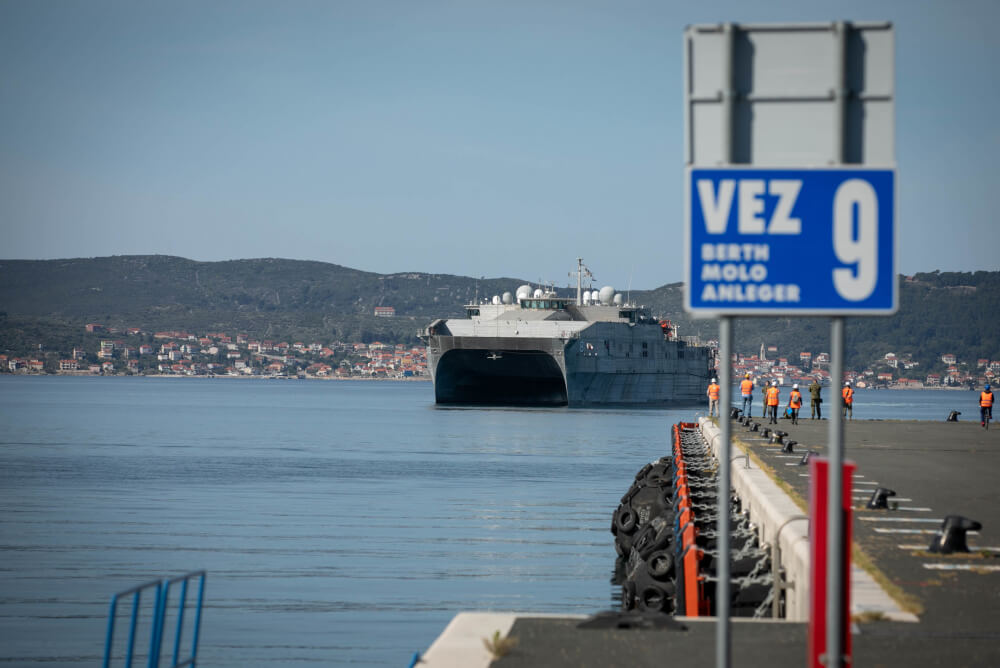
U.S. Naval Ship Yuma arrives in Zadar, Croatia © Sgt. Alexandra Shea
As part of the exercise, U.S. Naval Ship Yuma and U.K. Vessel Hurst Point off-loaded more than 300 pieces of military equipment in Zadar, Croatia’s Gazenica port, after ferrying it from Durres in Albania. The delivery started on Tuesday, May 4, and it was concluded on Friday. The journey of the equipment started back on March 24 at the Port of Jacksonville in Florida. The local U.S. National Guard units were shipping the equipment for three days onto USNS Bob Hope (T-AKR 300) after which, the ship stopped by Portsmouth in Virginia for the final pieces of equipment before heading towards Durres in Albania. In Durres, the smaller vessels took the equipment and finally loaded it to Yuma, and Hurst Point, which brought it to the gem of Northern Dalmatia, Zadar.
„This process is called Joint Logistics Over-the-Shore, a method used to ensure swift delivery of supplies and equipment in a variety of port situations“, explained the press release.
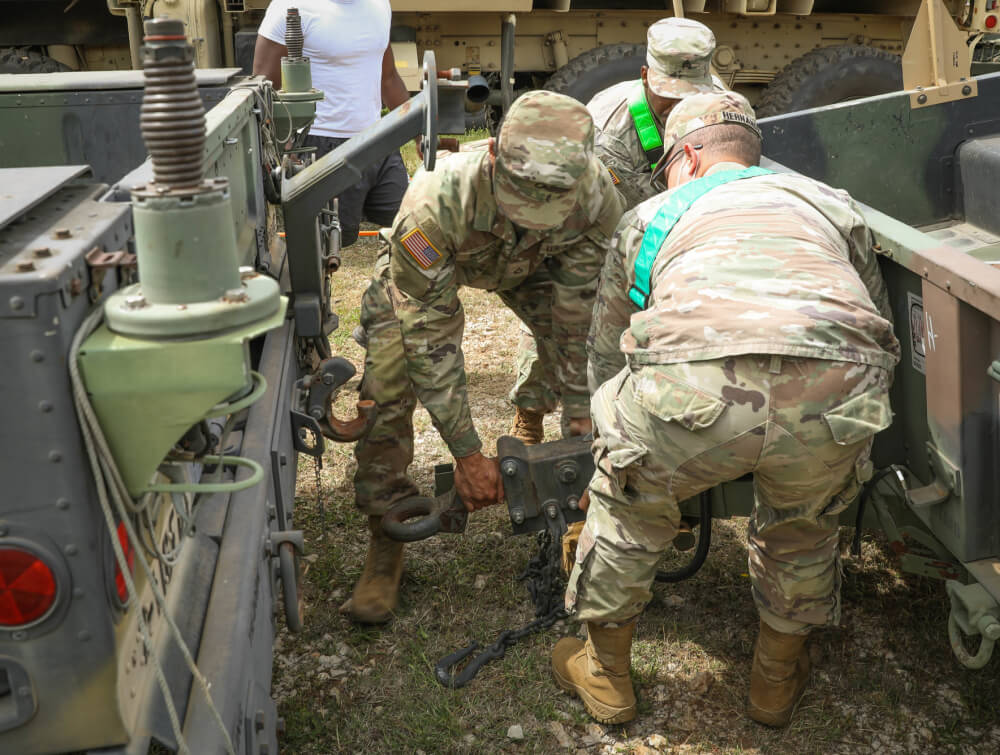 U.S. equipment leaves for training area © Sgt. Joshua Oh
U.S. equipment leaves for training area © Sgt. Joshua Oh
While many would probably stop at Zadar and chill for a lovely holiday, the equipment, however, will continue its journey. Part of the equipment will remain in Croatia, but it will be transferred to Slunj, home of the Main Training Area, and the rest goes to training areas scattered in Bosnia and Herzegovina (BiH). In BiH, the drills and maneuvers for which the equipment will be used are under the umbrella of the linked exercise named "Immediate Response 21” which will culminate in a joint, multinational live-fire demonstration called “Croatian Rampart 1991-2021” at the end of May. Not just as a test of possibility in the „God-forbid-we-are-attacked“ scenario, Croatian Rampart 1991-2021“ also celebrates the 30th anniversary of the Croatia Armed Forces.
The Main Training Area in Slunj, Croatia and training areas throughout Bosnia and Herzegovina to be used in drills and maneuvers alongside members of the Croatian Armed Forces, under the umbrella of the linked exercise named "Immediate Response 21.” The exercise culminates in a joint, multinational live-fire demonstration called “Croatian Rampart 1991-2021” - which celebrates the 30th anniversary of the Croatian Armed Forces at the end of May.

British Major Dan Cornwell talking to Croatian press, screenshot / Defense Flash News
British Major Dan Cornwell told the Croatian press that the idea of being in Zadar is that Croatian, U.K., and U.S. forces operate together in loading U.S. equipment and personnel.
„We've done this before, on exercise last year in Germany, and I can say, it's a lot better down here in the south, it's absolutely amazing to be here in Croatia to do this alongside Croatian Armed Forces where we can better understand how we operate differently, how we operate similarly and equally building up our interoperability and our ability to operate better in the future“, said Maj. Cornwell, indicating that perhaps he can find Zadar, like many others, as a great holiday destination and not just the line of duty.
Learn more about Zadar on our TC page.
For more about the army in Croatia, follow TCN's dedicated page.
Friends of Croatia: European Parliament Office in Zagreb - First Contact with Croatian Citizens
May 6, 2021 - The third article in the series "Friends of Croatia: European Parliament Office in Zagreb", explores a small but dedicated office whose central focus is the 12 Croatian members of the European Parliament, as well as informing citizens and educating them about the European Union.
July 1, 2013, was a historic date for Croatian international integration as the country finally joined the European Union. The Union of developed European countries called for an enormous celebration on the main Ban Jelačić square in Zagreb. Many people saw different opportunities, and lots of opportunities were promoted by politicians ahead of joining. But, with almost eight years in the EU, could we actually list specific benefits and determine if Croatia is truly taking part in the „European dream“?
„EU membership made Croatia stronger, and there are many examples of the practical effects of it. I’ll mention two important ones: access to the common market and commitment and implementation of numerous political and economic reforms. Of course, one of the most visible immediate results of the EU membership was the end of customs controls at internal EU borders, which made crossings much smoother, with less hassle for people and goods. The removal of administrative and tariff barriers meant lower costs for businesses which – in combination with access to significant EU funds - translated into concrete economic advantages, helped the recovery, and increased exports. Also worth mentioning - the interest rates on loans have dropped, which lowered the costs of borrowing money for citizens and the business community, and this will be become even more pronounced once the country joins the euro. When it comes to Croatia’s contribution to the EU, along with its heritage, culture, and tradition that enriched the bloc, the country also brought its example and enthusiasm for the EU enlargement to the Western Balkans. Croatia is a vocal advocate of the European perspective for the region and considers the enlargement to be the most effective transformation mechanism that the EU has“, summarized Violeta Simeonova Staničić, the Head of the European Parliament Office in Zagreb, which is dedicated as the first contact between the European Parliament (EP) and citizens in Croatia.
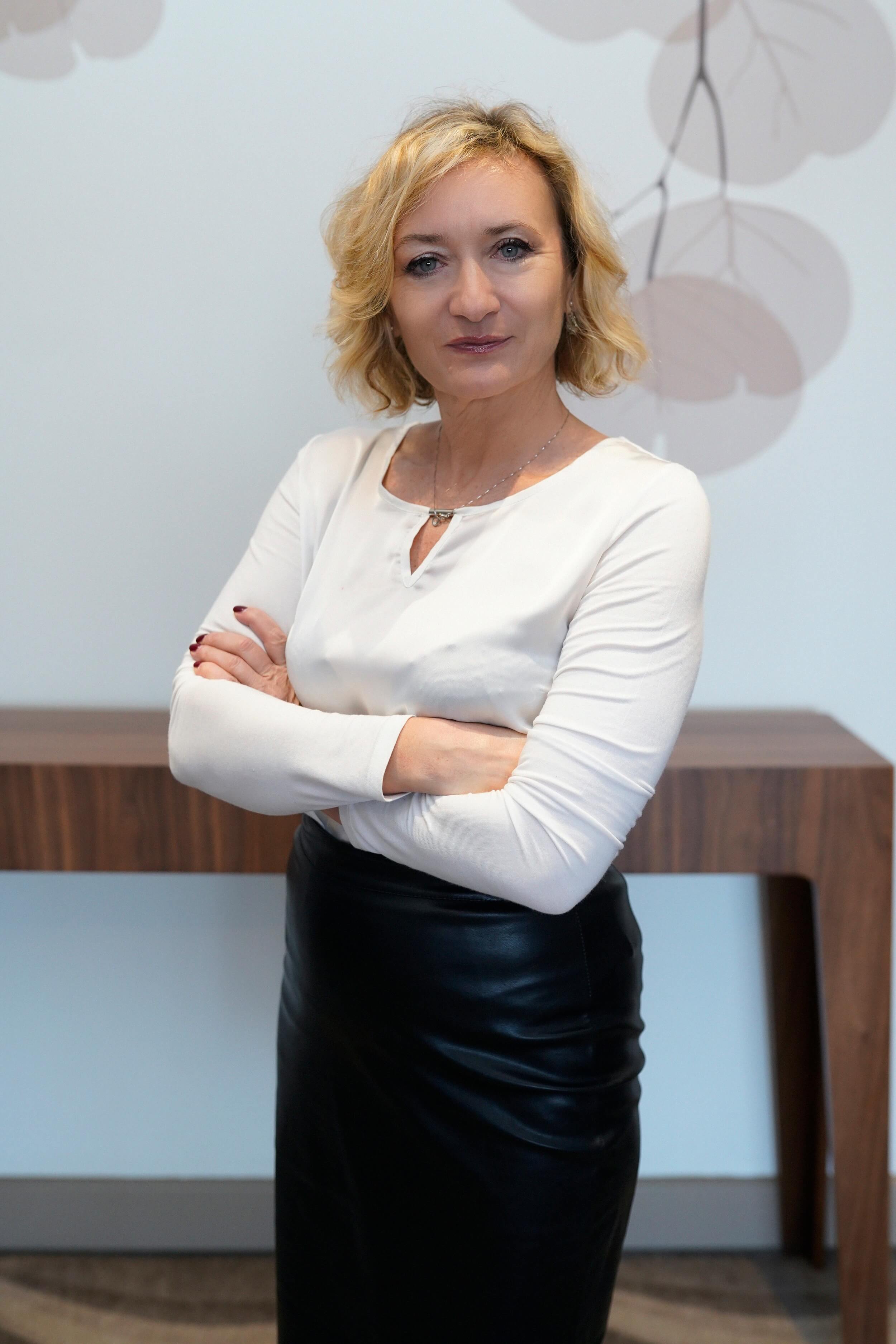
Violeta Simeonova Staničić © European Parliament Office in Zagreb
The Office started its work in February 2013. Simeonova Staničić and three other associates put the whole project in a small space in the backyard of a former EU delegation. Describing the team in 2013 as the „EP Delta Force“, Simeonova Staničić recalled the difficulties of their early engagement. „It was difficult to operate properly and to be visible as the country was not yet a member state, so we were not able to function as an official liaison office. We couldn't even do a proper information campaign for the first EU elections when Croats decided who would be their first official members of the European Parliament“, she said.
While any EU organization is often perceived as big and loaded with people, the EP office in Zagreb counts six staff members. Being a complex organization which can often be misunderstood, their informative service on all thing EU is extremely important.
„People tend to have a lot of misconceptions when it comes to the competencies of the EU. In various policy areas, EU member states still hold primary responsibility. Health policy, for example. Social policies and retirement as well. In others, the EU is in the lead as it is ultimately more beneficial for all countries involved that decisions are made and actions taken with the interests of the entire Union in mind. Unfortunately, too often, we can see that when something good happens, usually national governments are credited for it, and if something is not going well, then Brussels naturally is to blame. But various crises and challenges have shown that the EU is at its finest when working as a team player, one community and a common market“, explained Simeonova Staničić. She added that when solidarity prevails, everyone gains a sentence that can underline the usefulness of international cooperation that is the EU.
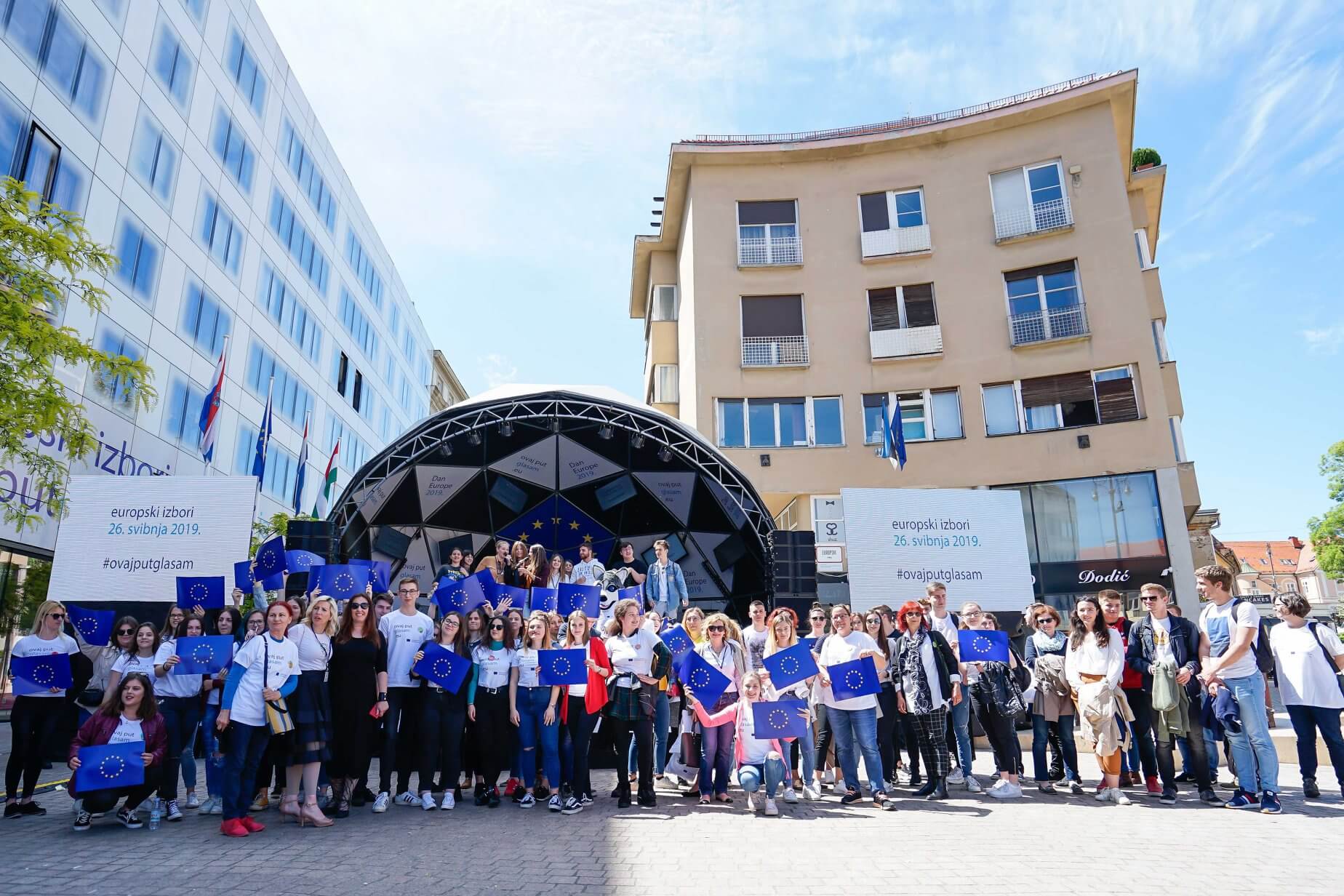
2019 EP elections campaign "This time I vote" © European Parliament Office in Zagreb
The citizens recognize the help the Zagreb EP office can offer, and the Office gets lots of inquiries daily. Over time, the phone calls were more often replaced by e-mails, and first contacts are often made through the Office's social networks. 45,000 followers on Facebook and heavy engagements on Twitter and Instagram, and the quick response of the small staff are certainly admirable.
„We sometimes receive the bulk of documents as many people send us copies of their dealings with various institutions or judicial bodies. These types of problems are, of course, beyond our remit, but we will always try to help people to identify the right authority they need to address and contact in order to resolve their issues. We also get requests from various researchers and scholars who need help with finding certain data and material important for their work, or who need background information on a certain topic“, said Simeonova Staničić, adding the questions they receive are quite diverse.
The central part of the Office’s daily work revolves around 12 Croatian members of the Parliament. “Working with Croatian members of European Parliament is our daily priority and what we center our work around. We organise press conferences and events around issues they work on and committees that they are members of. We cooperate and communicate with them very successfully, as we foster a mutually beneficial relationship with them. As a rule of a thumb, we virtually have no event without a member of European Parliament present“, Simeonova Staničić explains.
The other part of the Office's role includes working with youth, media, and NGOs.
When it comes to the media, the Office informs daily about ongoing debates and discussions concerning the day-to-day activities of the European Parliament. They also strive to put important decisions in context and promote and explain the work of members of the Parliament. Before the coronavirus pandemic, the Office even invited journalists to follow the plenary sessions in Strasbourg to give them the opportunity to familiarise themselves better with the institution and its role in the EU decision-making process. In return, a steady community of journalists following EU affairs is formed in Croatia, and the expansion of reporters is something the Office always welcomes. The accent is put on working with local media, and several outlets managed to get co-finance for their projects by European grants.
Cooperation with NGOs depends on every project and topic of interest, but with the diversity of NGOs, some sort of collaboration with some organisation is always ongoing.
Regarding the youth, two projects stand out. „Our two most successful projects to date are Euroscola and European Parliament Ambassador School Programme (EPAS). Euroscola became so popular among all Croatian schools that whenever we had rounds of regional or national selections, we had over 100 schools competing for very limited quota to go to Strasbourg for a day at the European Parliament. Through Euroscola, we created a fantastic network of incredibly involved, active, hard-working schools all over Croatia. The EPAS program was launched in 2016, and today we have a wide network of over 50 high schools scattered across the country. They cooperate closely with us and follow the work of Croatian MEPs throughout the entire school year“, pointed out Simeonova Staničić.
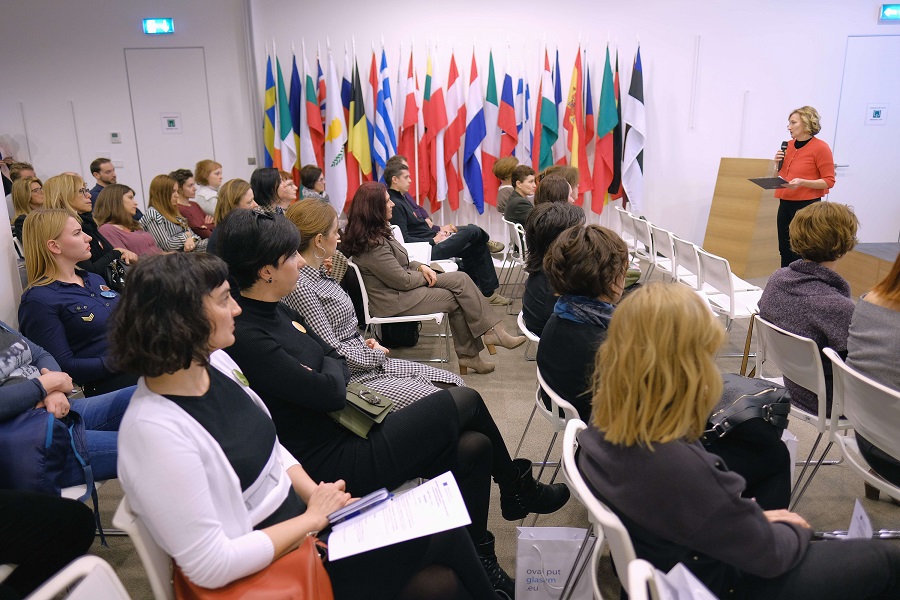
Senior EP Ambassadors © European Parliament Office in Zagreb
Apart from media and citizens, the cooperation with the official bodies of the state is at a high level too.
„We collaborate very well with the Ministry of Foreign Affairs and other government institutions. For example, we cooperate when the delegation of the European Parliament comes to Croatia to work on a certain topic related to the upcoming legislation. This cooperation was particularly pronounced in the run-up to and during the first Croatian presidency of the Council of the European Union“, said Simeonova Staničić.
Particularly good collaboration is also made with the Croatian Parliament, a natural counterpart of the European Parliament. Currently, they are organizing the conference on the future of Europe, but also a more regular public award ceremony for the European Citizens’ Prize (established in 2008 by the EP to award individuals or groups that contributed to empowering European Integration).
„We are also regularly in contact with foreign embassies in Croatia, in pre-Covid times they were not only guests at our events, but also provided interesting speakers from their own countries for our panels and conferences “, described Simeonova Staničić the vast web of cooperation the Office has in Croatia.
Although being an Office for the European Parliament, they also help citizens by giving information on other EU institutions and how to get in touch with them. Informing citizens of ways to actively take part in European democracy, Simeonova Staničić describes as „the core of everything we do as an office of the most democratic institution of the EU“.
„European citizens can petition the European Parliament through our dedicated portal (European's Citizens's Initiative). This is a very transparent process whereby individuals or associations can submit a petition on a subject which comes within the European Union’s fields of activity and which affects them directly “, she explained.
Croatian perception and EU scepticism.
Perhaps it depends on the algorithm or just the loudness of its spokespersons, but it seems Euroscepticism is on the rise in Croatia. Still, Simeonova Staničić's view is much more optimistic and based on the public opinion surveys.
„Actually, the latest Eurobarometer survey shows that 78% of participants in Croatia state that EU membership is beneficial to Croatia, and 74% of those asked believe that COVID-19 economic recovery will be faster thanks to the EU. The majority of the respondents also answered that they have a positive image of the EU“, she said. She continued, however, that almost similar in size is the number of people who have neither negative nor positive opinions.
„For us, these 'non-committal' ones are really important and we try to reach them with our work. We need to raise their awareness about the advantages of the EU; thus, we mainly address young people, who are natural citizens of the EU, who are so accustomed to all the freedoms and opportunities the EU gave them that they take them for granted. They are not aware that there was a time, not so long ago, when these opportunities did not exist“, explained the Head of Office headmistress.
She added that entrepreneurs, managers, and small and medium business owners are most aware of EU benefits, making them natural partners and ambassadors with whom the Office also works really well.
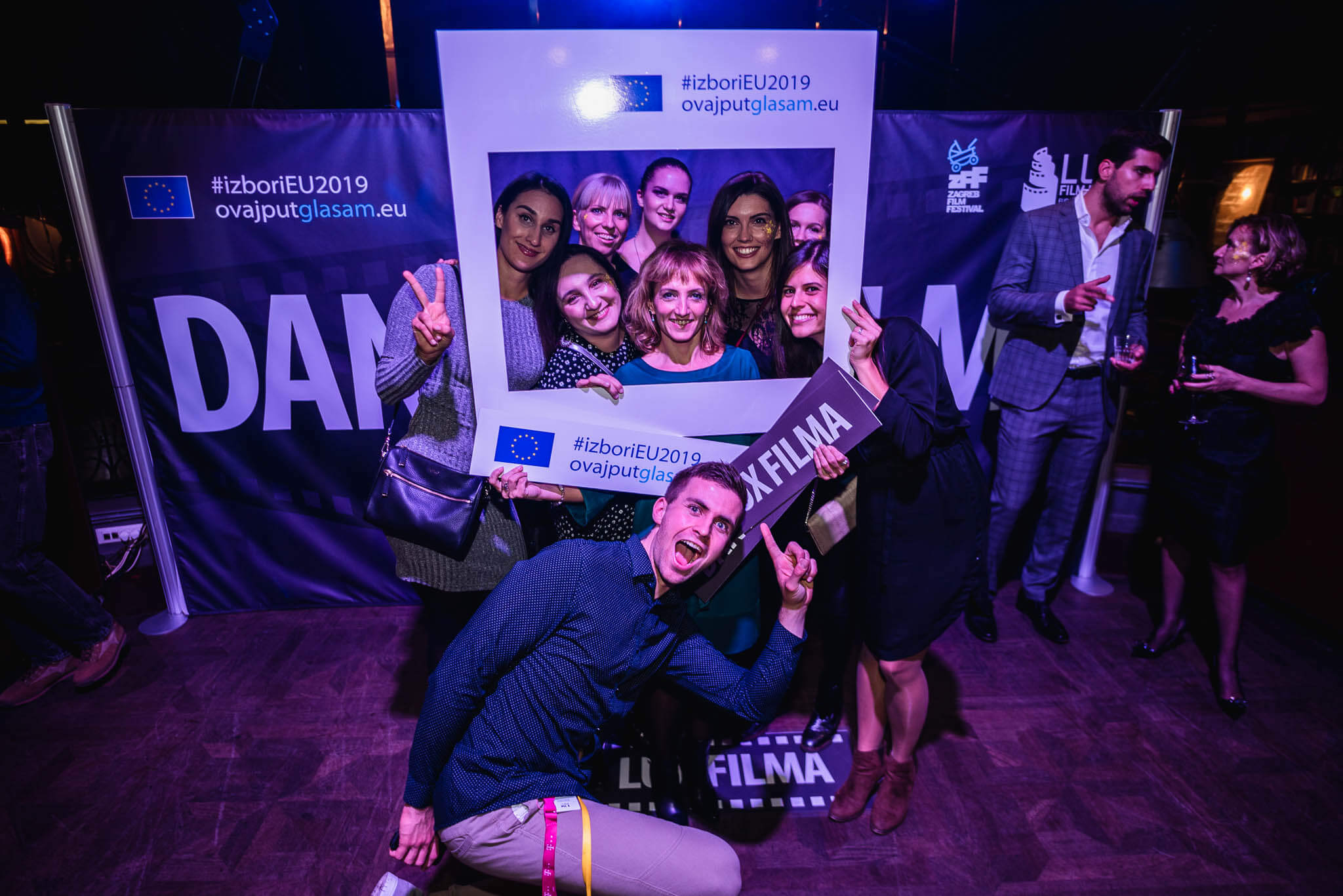
Lux Party on election year © European Parliament Office in Zagreb
In similar rhetoric, Simenonova Staničić dismissed my thesis that young people recognize the easier traveling and working in other member countries as the only benefits of the EU. Firstly pointing out that „freedom of movement, freedom of choice, and the privilege to be employed without administrative barriers in any member state is one of the biggest values and benefits coming from an EU membership“, which means „escaping Croatia is not the right terminology“. Also, just as Croatians are leaving the country, other countries experience the same thing as their citizens are coming to Croatia.
„Due to the pandemic, we are actually witnessing more EU nationals temporarily moving to Croatia, as they work remotely. There is a large community of EU nationals which continues to grow, and it has a lot to thank Croatia’s EU membership“, argued Simeona Staničić.
Indeed, the reputation, and trust in the global community secured by EU membership, certainly contributed to the rise of digital nomads coming to Croatia, on which TCN regularly reports.
The Head of Office once again repeated how most of the benefits in EU Croatians regularly experience and are enjoyed without realizing it is thanks to the EU.
„When there is a new school lab or student housing being built with European funds, or when our young people go off to university or college and take for granted that they would go on an Erasmus exchange; when they don’t have to pay major tuition fees while studying abroad in some other EU member state but are charged the same rate as locals; when, together with other European countries like France, Belgium, and Germany, your government is part of negotiations on major questions of international importance: from health to peace and security...“, she listed various examples.
When asked to comment on Croatia's respect for human rights and European values, a question inspired by last year's cases the Republic of Croatia lost in the European Court of Human rights in Strasbourg, Siemonova Staničić refused to comment and instead explained that the role of the Office in Zagreb (as well as anywhere in Europe for that matter) is not political.
„We are here to provide support to members of the European Parliament in the exercise of their official mandate on the hand and to ensure that people understand actions of the Parliament and to encourage them to engage in the European democratic process on the other. This is important because citizens have tools to influence the legislative agenda of the EU directly “, explained Simeonova Staničić. For the already mentioned European Citizens Initiative, the EP must consider proposals with 1 million verified signatures.
Zagreb office for every EU citizen: Speaking English, Croatian, and six more languages!
As the EU is dedicated to being beneficial for every EU citizen from every country in the organization, so is the EP Office in Zagreb. Simeonova Staničić says the Office serves every EU citizen in Croatia, and whether - in person or online, they will address any issue or interest non-Croatian EU citizens may have and gladly respond and engage.
„In general, we work in the language of our host, which in this case is Croatian. Nevertheless, every European official is obliged to pass the employment exams in one of the working languages of the European Union and within two years to be able to work in 3 languages. In our case, our Office uses predominantly Croatian and English, but I am proud to say that my colleagues are proficient in many languages, and we can serve European citizens also in French, German, Slovenian, Bulgarian, Dutch, and Italian, without hesitation“, assured Simeonova Staničić.
The same service is also offered to Croatians in other EU countries, as every member state has an EP office. And cooperation being the keyword, the offices are frequently in touch as well.
"For example, the Parliament organized an online solidarity event called #EPASwithPetrinja where pupils from three member states (France, Ireland, and Spain) engaged with their counterparts from Petrinja and Zagreb to express solidarity in the wake of the disastrous earthquake that hit parts of Croatia and to comfort children their age from those hard-hit areas. At the event, we had members of the European Parliament from France, Ireland, and Croatia as speakers,“ Simeonova Staničić gave one example, adding that the cooperation is also there whenever there is a common topic or members of the European Parliament from different delegations work on major legislative or policy issues of interest to European citizens across the Union.

EPAS with Petrinja © European Parliament Office in Zagreb
The EP offices are always located in the capital city, and several countries also have the so-called „Antenna offices“ located in other larger cities such as Germany (Munich), France (Marseille), Poland (Wroclaw), Spain (Barcelona), and Italy (Milan).
„We do not have offices around the country. However, both our Office and the Representation of the European Commission in Croatia use the network of the so-called Europe Direct Information Centres. There are 10 of them in Croatia currently, and they are located in Petrinja, Slavonski Brod, Čakovec, Šibenik, Zadar, Osijek, Virovitica, Split, Pula, and Karlovac. They are not under our authority - we do not control them, and they are not a part of our structure. But they are our natural partners in various activities and often serve as local contact points“, explained Simeonova Staničić.
To conclude, the European Parliament Office in Zagreb is open to assist anyone that wants to receive any information related to the European Parliament - be it regarding its debates, ongoing plenaries, committee meetings, work of the members of the European Parliament, or general information concerning other European institutions.
The address of the Office is Augusta Cesarca 4 in the House of Europe on European Square in Zagreb, which is open from 9 am to 5 pm (however, due to the pandemic, the office is closed to the public until further notice). At that same time, you can reach them on the general E-mail This email address is being protected from spambots. You need JavaScript enabled to view it. or on the following phone numbers:
For public relations (citizen inquires):
Violeta Simeonova Staničić (Office head): + 385 1 4880 280 (E-mail: This email address is being protected from spambots. You need JavaScript enabled to view it.)
Janja Mateja Aleš (assistant): +385 1 4880 269 (This email address is being protected from spambots. You need JavaScript enabled to view it.)
Andrea Čović Vidović: +385 1 4880 273 or +385 91 510 6830 (E-mail: This email address is being protected from spambots. You need JavaScript enabled to view it.)
Marko Boko: +385 1 4880 274 (E-mail: This email address is being protected from spambots. You need JavaScript enabled to view it.)
For media relations:
Maja Ljubić Kutnjak: +385 1 4880 272 or + 385 99 490 4715 (This email address is being protected from spambots. You need JavaScript enabled to view it.)
Barbara Peranić: +385 1 4880 272 or + 385 99 271 3026 (This email address is being protected from spambots. You need JavaScript enabled to view it.)
You can also follow the Office on Facebook, Twitter, Instagram, Youtube, and Flickr.
For any changes with the address, contacts, etc., check their official website.
To read more from the series "Friends of Croatia", follow TCN's dedicated page.
For more about European Union in Croatia, follow TCN's dedicated page
Defence Minister Mario Banožić Meets With Hungarian Ambassador Csaba Demcsák
ZAGREB, 5 May, 2021 - Defence Minister Mario Banožić on Wednesday met Hungary's incoming Ambassador to Croatia, Csaba Demcsák, expressing satisfaction with Croatian-Hungarian friendly relations.
"Both sides expressed their satisfaction with the long-lasting friendly relations between the two countries while Minister Banožić said that the two countries have developed excellent bilateral military cooperation," a press release from the defence ministry notes.
Banožić spoke about Croatian-Hungarian cooperation within the RACVIAC centre for security cooperation and the Central European Defence Cooperation (CEDC) and at the Multinational Division Command Centre in Hungary, established jointly by Hungary and Croatia, as well as about their cooperation in the EU and NATO.
Ambassador Demcsák presented Hungary's current defence policy, underlining that he believes in the continuation of the two countries' good cooperation, the ministry's press release notes.
For more about diplomacy in Croatia, follow TCN's dedicated page.
French Institute in Croatia Launches Hospitality Programme
ZAGREB, 4 May, 2021 - The French Institute in Croatia has on the occasion of its 100th anniversary launched a Hospitality programme which in cooperation with various institutions enables close public contact with artists.
The programme is adapted to Croatia's specific context, featuring the consequences of the health crisis and earthquakes that hit Zagreb and Sisak and Petrinja in central Croatia and is aimed at developing a programme of valorisation of Croatian artists in the premises of the French Institute where they can present their works and establish contact with a new audience.
The planned encounters are aimed at enabling a privileged experience and relationship with artists and their works, something that has been absent during this period of restricted encounters.
The institute has called on artists to participate in the programme, saying that they will be issued with a 'carte blanche' to take over the institute's premises for specific encounters with the public and to present their works.
For more about diplomacy in Croatia, follow TCN's dedicated page.


